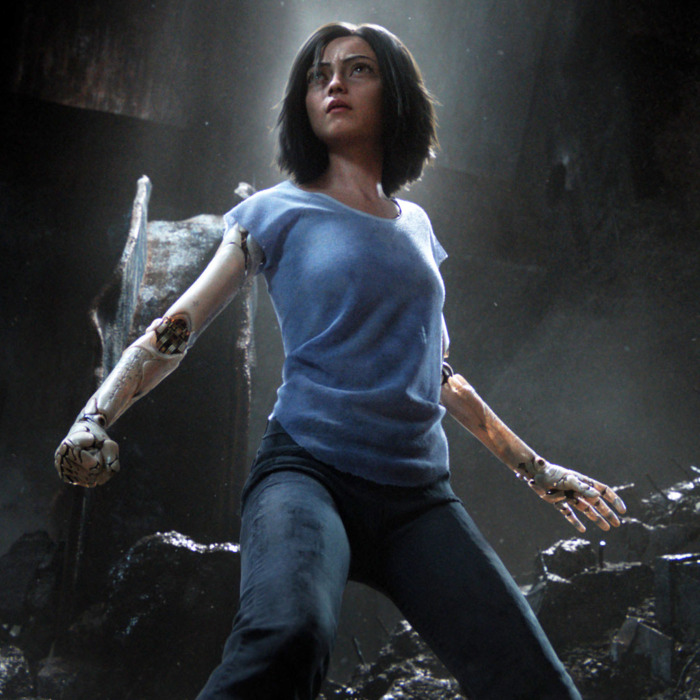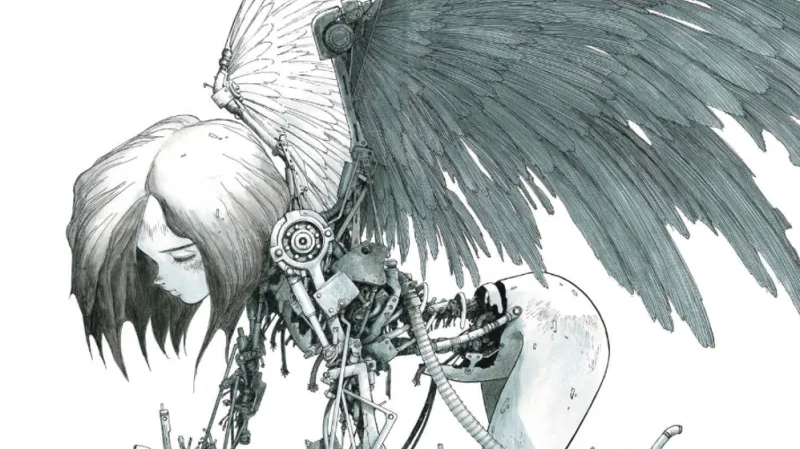I just got back from seeing Alita: Battle Angel, which I quite enjoyed, particularly for a) its beautifully realised cyberpunk cityscape, and b) the mo-cap performance of the lead.
The movie bills itself as being based simply on the original manga (Battle Angel Alita a.k.a. Battle Angel a.k.a. Gunnm) (which I haven’t read), but from what I understand it’s based at least as much on the 1993 anime adaptation (which I have seen – and so can you, below):
MILD SPOILERS BELOW:
The character of Chiren, for example, who has a very important role (though not precisely the same role) in both the anime and the live-action movie, is, I understand, completely absent from the original manga. Indeed, the movie follows the storyline of the anime extremely closely. The only major respects in which the movie’s plot deviates from that of the anime are the Motorball competition, the exploration of Alita/Gally’s past, and the introduction of Nova (all of which are, I gather, elements drawn from the manga). Even the repeated line about “an insignificant girl” is a nod to the anime’s closing theme song (which in other respects has little to do with the story – as is often the way with theme songs in anime).

One major improvement, for me, that the movie makes over the anime is in Alita/Gally herself. The frequently infantilised portrayal of heroines in anime, with their exaggeratedly squeaky voices and little-girl faces, tends to get on my nerves. The movie version avoids this (despite keeping the artificially gigantic eyes typical for anime heroines, which some viewers found off-putting, but which I thought worked fine here, as the character is a cyborg after all). Rosa Salazar’s strong, grounded performance, combined with masterful mo-cap and CGI work, carries the film.
Western film adaptations of manga and/or anime have sometimes been criticised for casting non-Asian actors to play originally Asian characters (as with 2017’s Ghost in the Shell). But that doesn’t seem to be as much of a worry here, as the main characters in the Battle Angel anime were not clearly Asian, and many were clearly non-Asian, particularly Ido, Chiren, and Vector. (It’s less clear whether or not Alita/Gally and Hugo/Yugo were intended to be seen as Asian in the anime.) Moreover, the original manga apparently depicts the action as taking place in a future North America (and not, e.g., Japan). (Still, you’d think at least a few more of the live-action film’s supporting cast would be Asians, yet offhand I recall only one or two. There are Asians in North America, y’know.)
As a feminist heroine the film’s Alita is a bit of a mix. Her defiance of male authority, even the well-meaning but somewhat suffocating authority of her father-figure Ido, is inspiring, but her willingness to sacrifice everything (including her literal heart) for the sake of her obviously less-than-worthy boyfriend Hugo is a bit disappointing. Still, love doth occasionally make idiots of us all.

The film’s treatment of class, which follows the anime (and, I presume, the manga), is a familiar one in science fiction: the privileged elite live in a floating city (with a strict closed-borders policy) high above the masses, who are relegated to a crappy and perilous existence below (recall, e.g., 2013’s Elysium) – though this theme is undercut a bit by how vibrant and exciting Alita finds the ground-bound city to be.
The most surprising feature of the movie for me was how short the closing credits were. Usually, for a movie this effects-heavy the credits go on forever, but these credits seemed to be over in a flash.
Admittedly, Alita: Battle Angel doesn’t really explore any issues that haven’t been explored onscreen a hundred times before; but it’s fun and visually striking. I hope it does well enough to merit a sequel, since as things stand the movie pretty clearly ends in mid-story.

“but her willingness to sacrifice everything (including her literal heart) for the sake of her obviously less-than-worthy boyfriend Hugo is a bit disappointing.” -> Honestly, if more women did this, I would respect women more. I am tired of the ‘men should sacrifice for the girl’ trope, male disposability is a pain.
“Her defiance of male authority, even the well-meaning but somewhat suffocating authority of her father-figure Ido, is inspiring, but her willingness to sacrifice everything (including her literal heart) for the sake of her obviously less-than-worthy boyfriend Hugo is a bit disappointing. Still, love doth occasionally make idiots of us all.” – In fact, I go so far to say that the second part is the only part feminists should be proud of. The first part just sounds like the ‘patriarchy’ “it-is-so-hard-to-be-a-women” mumbo jumbo everyone is tired to hear about. It is funny the same women who says that ‘women can be strong and independent’ are also the first to talk about how hard and difficult it is to be a woman. It is really hard to respect them when they say these type of things.
If you’re looking for a sympathetic ear for your misogynist bullshit you’ve come to the wrong site.
‘Male disposability’ is not even an anti-feminist concept: “Ivana Milojević notes that while patriarchy assigns the role of sex object to women, it assigns to men the role of violence-object, with male expendability being corollary to the sexual objectification of girls” – https://en.wikipedia.org/wiki/Male_expendability
“but her willingness to sacrifice everything (including her literal heart) for the sake of her obviously less-than-worthy boyfriend Hugo is a bit disappointing. Still, love doth occasionally make idiots of us all.”
Yes, indeed love doth occasionally make idiots of us all. I cringed a little at this scene, but mostly because of how aggressive Alita comes off in it. Hugo wakes up to find she’s been crouching on his window sill watching him sleep. They barely know each other. Then she offers him her literal heart. Whoa, slow down there, lady! But I found it thoroughly believable. She’s young and “in love,” has amnesia, and is pure, naive, idealistic, innocent, earnest. I love how visibly uncomfortable Hugo gets at her offer, because he’s painfully aware how unworthy he is of it. She’s a truly good person and he does shady things she’s not yet aware of to further his dream of getting into the floating city. She’ll learn though. Also, it’s not like she’s offering to sacrifice her life (everything) for his dream. She’s offering her extremely valuable, yet replaceable (as she herself points out), mechanical heart. I also think that her all-or-nothing attitude and selflessness could be at least partially attributed to her military conditioning. So I don’t find this scene to be disappointing from a feminist perspective. Quite the contrary, Alita is a strong yet feminine, independent badass woman despite her history and circumstances.
Here’s a good take on the manga, anime, and movie trailer, prior to seeing the movie, with emphasis on the “born sexy yesterday” trope that alita intentionally subverts:
https://www.youtube.com/watch?v=RJ6dBpT4JcE
And here’s the same guy’s review of the movie:
https://www.youtube.com/watch?v=cCiefCg1z-w